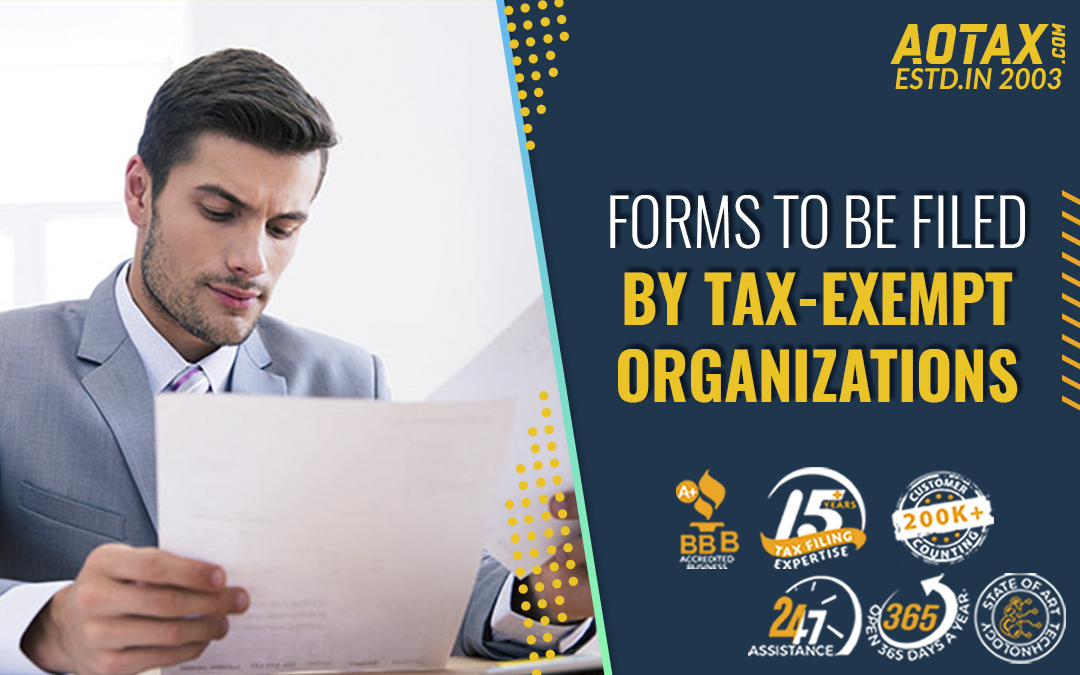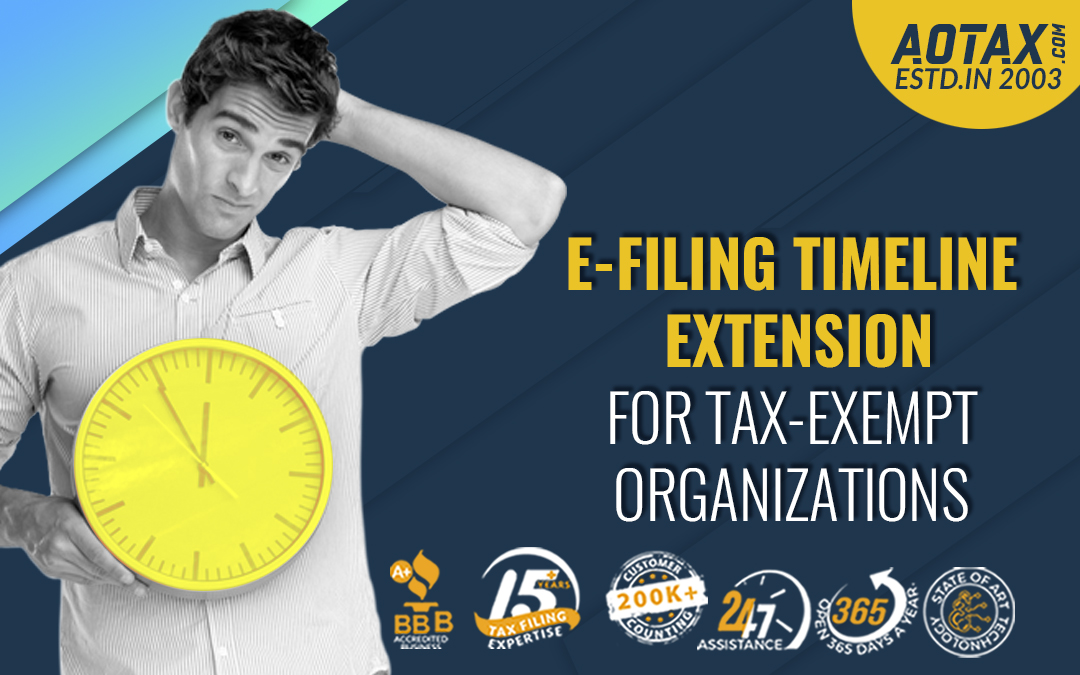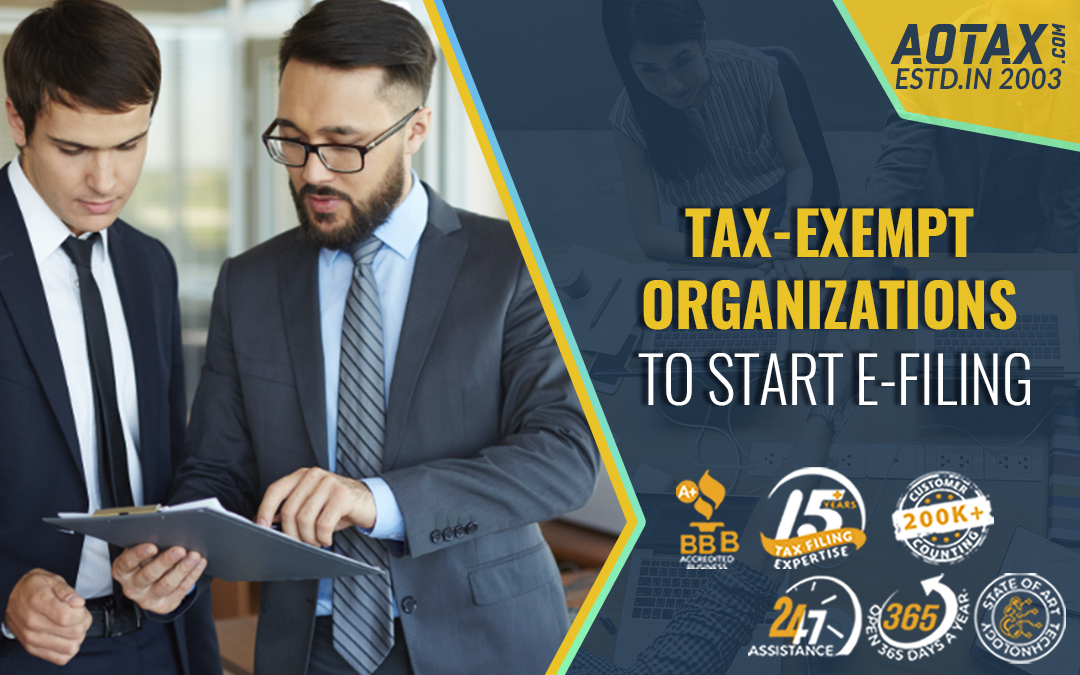Tax-exempt organizations to start e-filing
Non-profit organizations that do not distribute profits can be said to be exempted from federal income tax if they are organized for public purposes. There are several categories of organizations which can be considered in the group of “tax-exempt” such as Educational organizations, organizations associated with public society benefits, human services, organizations associated with arts, culture, humanities, health, public society benefits, trade associations, Veteran’s organization, etc. Even there are different kinds of mutual benefit organizations in the United States which are considered as a tax exempted.
The status of “Tax-exempt” confers an exemption from the Federal taxes on the earnings obtained from assets that produce income. In the year 2020, there are approximately 1.74 million organizations registered with the IRS which are tax-exempted. Even though many non-profit organizations qualify for tax-exemption, only two-thirds of these qualify for charities which can receive contributions that can be used as tax deductions.
E-filing by tax-exempt organizations
Out of the non-profit organizations which are registered with the IRS, there are around 35% organizations that need to file their annual federal income tax returns. The tax-exempt organizations ought to file certain forms with the IRS for which the due date is on 15th July 2020.
Tax-exempt organizations can file their necessary forms by IRS’s MeF (Modernized e-file). When e-filing is done by a tax-exempt organization; the organization would send the information return data directly to the IRS rather than using paper forms. The MeF can be defined as a web-based system that allows e-filing through the use of the internet. The XML (Extensible Mark-up Language) format is used by the MeF for storing and transmitting data. The e-file system of the IRS is available for all the tax-exempt organizations that prepare their tax returns themselves or for those who rely on tax professionals for their tax return preparation. Non-profit organizations and charitable trusts or organizations can file their respective forms by the use of the IRS Authorized e-file provider.
By the e-filing method, fast acknowledgment can be obtained from the IRS about the receipt of the return filing. Moreover, by the e-filing method, the processing time would be reduced thus, making compliance with reporting much easier.
Forms to be filed by tax-exempt organizations
Some of the major forms which need to be signed by the IRS can be listed below.

a.Form 990 which is a series of annual information returns which includes Forms 990, 990-EZ, 990-PF, and 990-BL. Tax-exempt organizations that have total assets worth $10 million or more need to file around 250 tax returns in a calendar year. These returns can be related to income, excise, information returns, employment tax, and many more.
The Form 990-PF needs to be filed by the private organizations and non-exempt charitable trusts by the e-filing method irrespective of their asset size.
b.Form 990-N which is an annual electronic Notice e-postcard meant for tax-exempt organizations. This form has to be filed by tax-exempt organizations that are small and have gross receipts of up to $50,000 in a year. Organizations that file this form do not need to file Forms 990or Form 990-EZ.
c.Form 990-T is used by tax-exempt organizations to report unrelated business income. Also, it is used by tax-exempt organizations to report unrelated business income tax liability and report proxy tax liability. Moreover, it can be used to report unrelated business income tax on reinsurance entities.
d.Form 8871 is used by the political organization for notifying the IRS about the organization being a tax-exempt organization of Section 527 Status. If an organization has annual gross receipts of $25,000 or more in a particular taxable year then it must file this form.
e.Form 8872 is filed by a political organization in the form of a report of its contributions and expenditures
f. Form 1120-POL represents the annual income tax returns for political organizations. This form is signed to report about the organization’s taxable income and income tax liability Section 527.
g.Form 4720 is meant for reporting of Private Foundation Excise Tax return and is mostly used along with Form 990-PF.
E-filing timeline extension for tax-exempt organizations

If tax exempt organizations feel that they would not be able to file their respective forms by 15th July 2020, they can request for an extension in the timeline. This extension request can be done by filing Form 8868. An extension of six months beyond the original due date to file the returns is provided to the tax-exempt organizations filing Form 8868. However, extension in the timeline for filing tax returns does not provide an extension in the timeline for making the Income-tax payments if due for a tax-exempted organization.
Conclusion
Hence, almost all forms used by the tax exempted organizations can be filed by e-filing method except the Form 990-T. The IRS has been constantly motivating the tax-exempt organizations to make use of e-filing for filing their tax returns.


Recent Comments